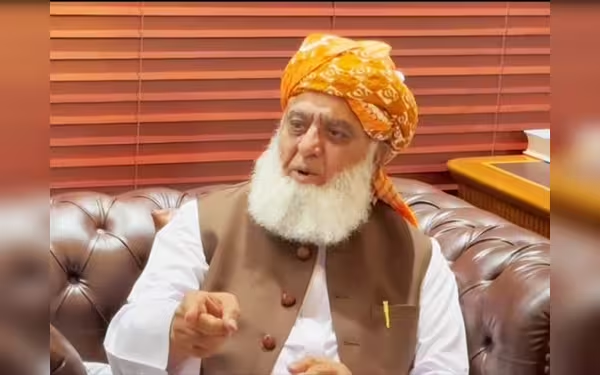Tuesday, July 2, 2024 03:12 PM
Maulana Fazlur Rehman criticizes government policies in National Assembly speech
- Voiced strong opposition to Azm-e-Istehkam Operation
- Highlighted displacement of civilians in tribal areas
- Critiqued government for inadequate compensation and economic challenges
 Image Credits: The Express Tribune
Image Credits: The Express TribuneMaulana Fazlur Rehman, the leader of JUI-F, criticizes government policies and military operations in his recent National Assembly speech, emphasizing the challenges faced by civilians in conflict-affected areas.
Maulana Fazlur Rehman, the leader of Jamiat Ulema-e-Islam (JUI-F), voiced strong opposition to the Azm-e-Istehkam Operation during his recent speech in the National Assembly. He expressed concerns over the impact of military operations conducted since 2010, citing increased instability as a major consequence.
Fazlur Rehman highlighted the displacement of civilians, particularly in tribal areas, due to the ongoing operations. He emphasized the economic hardships and loss of dignity faced by people forced to leave their homes. The JUI-F leader criticized the government for inadequate compensation provided to those affected, stating that the funds allocated for rebuilding homes were insufficient.
In addition, Fazlur Rehman raised issues regarding government policies that have led to unemployment and economic challenges for citizens. He questioned the imposition of taxes without corresponding benefits and called for a focus on promoting peace and prosperity to encourage tax compliance among the population.
Furthermore, the JUI-F chief pointed out inconsistencies in government actions, particularly concerning Afghan refugees and border security measures. He drew attention to the difficult conditions experienced by populations in certain regions, including prolonged protests and economic desperation among border communities.
Maulana Fazlur Rehman's critique of the Azm-e-Istehkam Operation sheds light on the challenges faced by civilians in conflict-affected areas. His call for better compensation, economic stability, and transparent government policies resonates with the need for addressing the concerns of the affected populations. It is crucial for policymakers to consider the human impact of military operations and work towards sustainable solutions that prioritize the well-being of all citizens.













